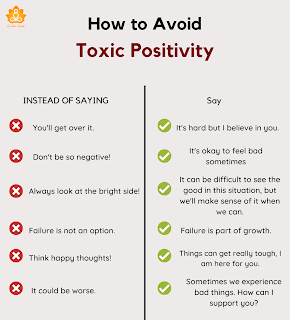Nowadays it is common to hear people say things like: think positive to attract positive things, look at the bright side always, avoid people who think negative, avoid drama, etc.
However, we do not realize that negative feelings and negative thoughts have an important function in our mental and psychical health. They alert us of what is not going well in our body and mind, so we can take care of it and grow.
For example, when you have a cold, do you ignore the symptoms and stay focused on the bright side of your life? Or you take action by taking some medicine or a natural remedy and getting enough rest until you feel better?
I am sure that all of us take care of our physical symptoms when we have a cold or another physical condition, but why we do not do this when we are feeling "mental symptoms"?
I my professional opinion, if we ignore our negative thoughts or feelings, we are entering a toxic loop of toxic positivity which not only will prevent us from overcoming our problem and grow, but also will add more stress and negative thoughts/feelings on us, because, since all people around us and mass media are telling us that we need to be positive, think positive and talk positive, as soon as we have a negative thought or a bad day, we feel "guilty" because we are not thinking or feeling positive and that in turn, will add more stress and negative feelings on us.
In addition, if you are having a bad day and share it with someone, and he or she answers you things like "just shake it up, look at the bright side", "I do not want drama", "if you think negative, that is what you will have" or "you become what you think"..., the only thing that you will get is a feeling of loneliness, and sometimes rejection by others.
At this point, I like to reflect on the difference between being positive and being optimistic. One of my favorite psychiatrist is Luis Rojas Marcos. He has written many books and conducted researches about this topic. He explains that a positive person is the one who avoids looking at the negative things in their life by just staying focused on the positive. However, since positive people do not address the negative things of their lives, they do not overcome or solve them and those negative things will not disappear. On the contrary, an optimistic person is aware of the negative things of his life, but instead of being focused on the problem, he is focused on the solution. This way, optimistic people are aware of their negative feelings or thoughts, but they understand them, they process them, they find solutions and they overcome them, which make them grow and be happier and more successful in all areas of their lives.
With this article that I am writing, I would like to encourage you all to do not pay attention to all those people who tell you that "you have to be positive". Instead, BE AN OPTIMISTIC PERSON and do not forget that it is okay to feel negative feelings or to have negative thoughts, just understand them and take action to change them.
In this link you can read a true story about a woman who experimented this.
And in the infographic I included above, you can find a comparative chart about how to talk to someone who is going through something hard and has negative feelings.






